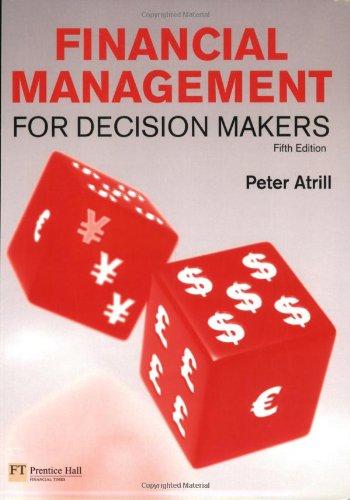Jubilee plc operates four wholesale food outlets in Scotland. After several years of sales and profits growth
Question:
Jubilee plc operates four wholesale food outlets in Scotland. After several years of sales and profits growth the business has recently experienced some financial problems. The financial statements for the year ended 31 May Year 6 are shown below:
Statement of financial position (balance sheet) as at 31 May Year 6 £000 Non-current assets Premises 4,600 Fixtures and fittings 90 Motor vans 115 4,805 Current assets Inventory 5,208 Trade receivables 5,240 Cash 6 Total assets 10,454 Equity £1 ordinary shares 1,400 Retained earnings 2,706 4,106 Non-current liabilities 11% loan notes Years 10–11 (secured on premises) 3,800 Current liabilities Trade payables 4,100 Tax due 53 Bank overdraft 3,200 Total equity and liabilities 7,353 Income statement for the year ended 31 May Year 6 £000 Sales revenue 45,000 Cost of sales (36,000)
Gross profit 9,000 Expenses (7,600)
Operating profit 1,400 Interest payable (1,050)
Profit before taxation 350 Tax (30%) (105)
Profit for the year 245 Dividends of £140,000 were proposed and paid during the year.
Inventory levels remained constant throughout the year. All sales and purchases are on credit.
In recent months the business has failed to pay trade payables within the agreed credit periods. In order to restore its credit standing, the business wishes to reduce its trade payables to an average of 30 days’ credit (all purchases are on credit). In addition, the business wishes to refurbish its outlets and to acquire a computerised accounting system at a total cost of £700,000. To finance these requirements, the business is considering making a rights issue of shares at a discount of 25 per cent on the market value. At present, shares are trading on the Stock Exchange at £1.60. Alternatively, the business may make an issue of 10% loan notes at a price of £96 per £100 nominal value to be secured on the premises.
In the forthcoming year, sales are expected to increase by 10 per cent and the gross profit margin is likely to remain the same as for the year ended 31 May Year 6. Expenses are likely to rise by 5 per cent during the forthcoming year. Interest charges on the overdraft are expected to be lower, due largely to falling interest rates, at £260,000. Dividends per share are planned to be the same as in the year to 31 May Year 6.
The raising of the necessary finance is expected to take place at the beginning of the year to 31 May Year 7. Issue costs relating to new shares and loan notes can be ignored.
Required:
(a) Treating separately each method of raising finance, calculate:
(i) the total number of shares, and (ii) the total par (nominal) value of loan notes that have to be issued in order to raise the finance required.
(b) Calculate the forecast earnings per share for the year to 31 May Year 7 assuming:
(i) a rights issue of shares is made, and (ii) an issue of loan notes is made to raise the necessary finance.
(c) Calculate the gearing ratio as at 31 May Year 7 assuming:
(i) a rights issue of shares is made, and (ii) an issue of loan notes is made.
(d) Discuss the major factors to be considered by Jubilee plc when deciding between a rights issue of shares and an issue of loan notes to raise the necessary finance.
Workings should be to the nearest £000.
Step by Step Answer:






